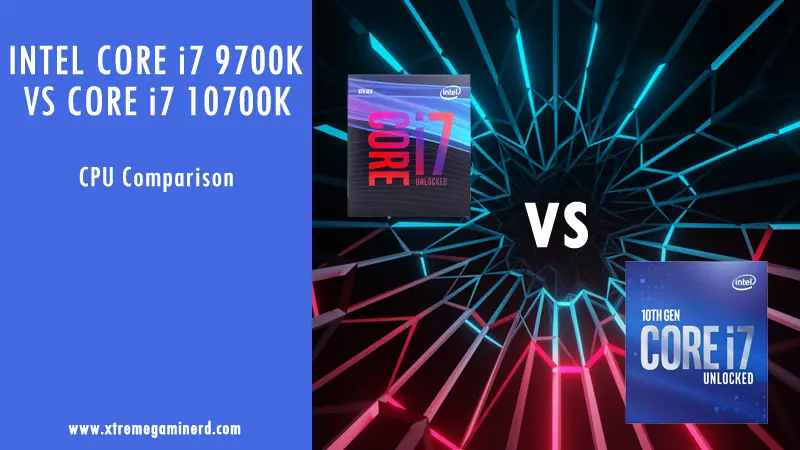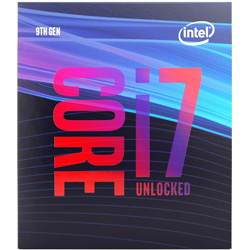
The Intel Core i7 9700K was released back in mid-November 2019 and at that time, the i7 9700K was a good processor in terms of gaming. Intel launched the Core i7 10700K in 2020 which can be possibly termed as an upgrade over the Core i7 9700K. As of the current date, the Intel Core i7 9700K is priced at $350, whereas the Intel Core i7 10700K is even lower. The specification that both the processor shares are at par except on certain things.
Specs comparison
The Intel Core i7 9700K features 8 cores and 8 threads, with an L3 cache of 12 MB, and a base operating frequency of 3.6 GHz out of the box and can be overclocked to 4.9 GHz. It is built with the 14nm CPU architecture and has a TDP of 95 W. The i7 9700K can support RAM up to 128 gigs of RAM.
The Intel Core i7 10700K features 8 cores and 16 threads with 16 Mb of L3 cache and an operating speed of 3.8 GHz out of the box that can be overclocked to 5.1 GHz via single-core overclocking or Intel’s Turbo Boost Max Technology 3.0. In this one, Intel also has included the Hyperthreading feature. The i7 10700K is also built upon the 14nm architecture and can support up to 128 gigs of memory. It comes with a TDP of 125 W.
Now if you are already familiar with the Computer components then by just reading the brief specification you already can spot the differences. However, if you are not aware of it and currently thinking about whether you should upgrade to the Core i7 10700K considering the fact that you are already using the i7 9700K, then after reading this whole article you will come to understand what you need to do.
Motherboard compatibility
This is where the big changes seem to appear. While the i7 9700K uses a few years old LGA 1151 socket motherboard, you will have to upgrade to an LGA 1200 socket motherboard in order to use the i7 10700K. Intel has now changed the socket altogether as it is generally does making the LGA 1151 motherboards not good for an upgrade.
Hyperthreading
The Core i7 10700K gives a massive performance boost over its earlier sibling the i7 9700K. Firstly, in the Core i7 9700K, Intel didn’t add the feature of hyperthreading which they did with the Core i7 10700K. This gives the Core i7 10700K a little performance boost over the Core i7 9700K.
Moreover, the Intel Core i7 10700K comes with double the number of threads than that of the Core i7 9700K making it capable of doing more multi-tasking than that of the Core i7 9700K. The default clock speed of the Core i7 9700K is 3.6 GHz and can be overclocked up to 4.9 GHz and on the other hand, the default clock speed of the Core i7 10700K is 3.8 GHz and it can be boosted up to 5.1 GHz. The Core i7 10700K also comes with a higher L3 cache when compared to that of the Core i7 9700K.
Thermals
The thermal conductivity of the Core i7 9700K is ideal for overclocking as it comes with a soldered integrated heat spreader (IHS) instead of the more basic Thermal Interface Material (Thermal paste) and a TDP of 95 W. And on the other hand, the Core i7 10700K is equipped with Thin Die STIM that Intel claims to provide an improved thermal solution. But the Core i7 10700K has a higher TDP of 125 W and instead of having a good thermal solution it generates a lot of heat.
Gaming and Productivity
Now coming to gaming, both the processor will perform quite well when equipped with the proper hardware equipment. But the Core i7 10700K will provide better overall performance for the increasing number of threads and also the inclusion of Hyperthreading.
When it comes to productivity i7 10700K beats the i7 9700K by up to 25% in most of the applications that include the Cinebench R15, Passmark, and Geekbench 4 as shown by the tests done by Gadgetversus. While in gaming, the difference is very very little and in most of the scenarios it can be declared that the extra 8 threads don’t help in achieving higher fps numbers if you already have an 8 core solid CPU. Check out the benchmarks done by the Random Benchmark Youtube channel for the comparison:-
Should you go for the upgrade?
If the scenario for you is like this, you are already having the Core i7 9700K and after the release of the Core i7 10700K, if you are thinking about whether to upgrade or not, then you must think of a few factors that might play an important role.
Firstly the Core i7 10700K comes with better features (increased number of cores, increased clock frequency, increased L3 cache) than that of the Core i7 9700K, but it also comes with higher TDP and to get the best out from the Core i7 10700K, you will need a beefier cooling solution that can tame the beast and also a good power supply. You can refer to our topic of Best Coolers for Core i7 10700K for more information about it.
Further to in order to run the Core i7 10700K, you will need one of the latest Z490 or Z590 motherboards as it comes with Intel’s new LGA 1200 chipset and it will be an additional cost to keep in mind. You can check our recommendation for the best motherboards for i7 10700K if you want to achieve great results.
However, if you are a user, who doesn’t have upgraded for a long and currently thinking of what will be the best option if it’s time to upgrade or not, then you can go ahead with having this processor. It won’t let you down at all.
Conclusion
We have pointed out the important differences between the Core i7 9700K and the Core i7 10700K, and clearly the Core i7 10700K has the upper hand in terms of performance and features and is more future-proof. But there are a few things that are necessary to consider before going for it.
[box]

[/box]









